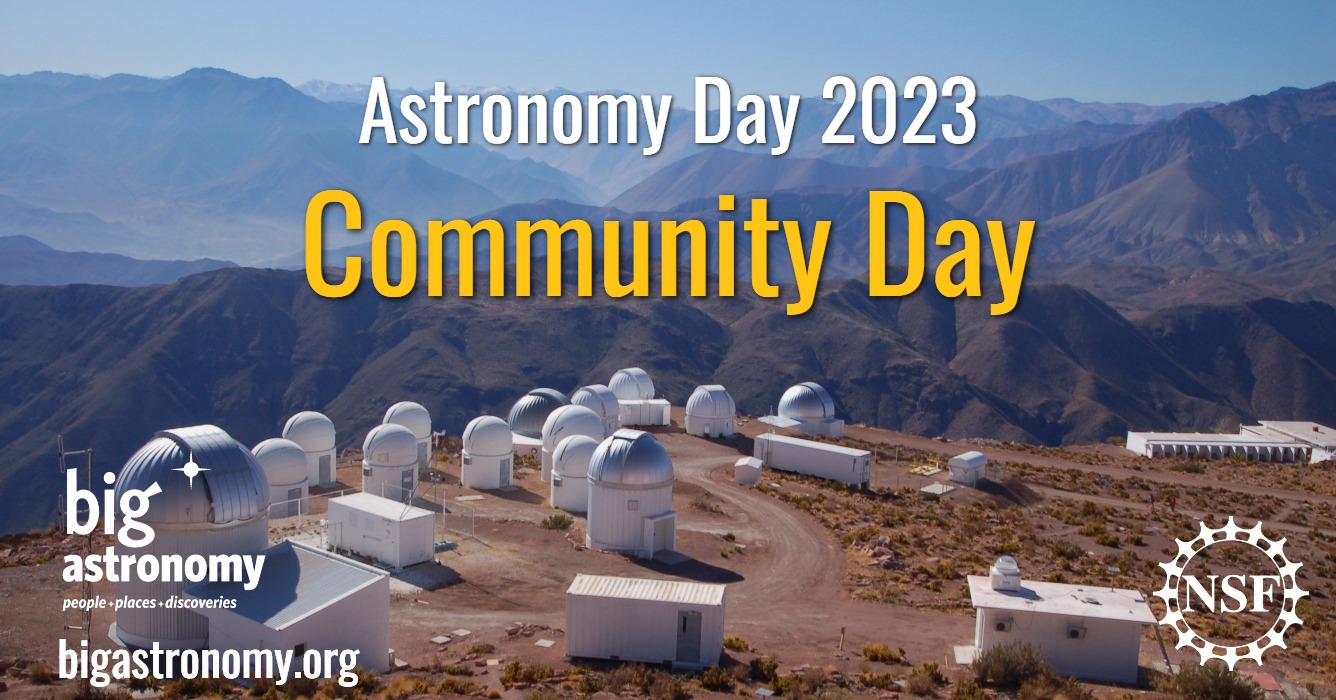A team of astronomers has made a surprising discovery using the U.S. National Science Foundation Green Bank Telescope (NSF GBT): eleven fast-moving clouds of cold, neutral hydrogen gas—akin to “ice cubes”—surviving deep inside the Fermi Bubbles.
Recent News
ALMA Reveals Stunning Details of Infant Galaxies in the Early Universe
The [CII] Resolved ISM in STar-forming galaxies with ALMA (CRISTAL survey) peered back to when the Universe was only about one billion years old – a mere toddler in cosmic terms. These observations are helping scientists understand how galaxies formed and evolved from primordial gas clouds into the organized structures we see today.
NSF NRAO Leads Critical Spectrum Studies to Safeguard Radio Astronomy
The U.S. National Science Foundation National Radio Astronomy Observatory (NSF NRAO) has received funding to expand its study of an invisible—and crucial—scientific and technological resource: the radio spectrum.
Astronomy Month Culminates with BIG Events

Participating Community Centers Eligible for Telescope Prize
April is Global Astronomy Month and Big Astronomy has big plans to round out the month. Throughout the month of April, communities across the world will host events screening the award-winning film “Big Astronomy: People, Places, Discoveries.” Schools, libraries, museums, planetariums and other community spaces that host a Big Astronomy Community Event during the month of April are eligible to win one of three high-powered telescopes.
The film highlights the communities, cultures and blue-collar workers that enable breakthrough discoveries in the mountainous deserts of Chile.
“When people think of astronomy, they often imagine astronomers peering through telescopes,” said Adam Cohen, AUI president and CEO. “And, they are unaware of the STEM village it takes to make exploration of the cosmos possible.”
Today, big observatories employ electrical and mechanical engineers, technicians, data analysts, machinists, heavy equipment operators, maintenance personnel, artists, cooks, etc. Each of these individuals play an important role in making astronomical discoveries possible.
Originally intended for planetarium display, the Big Astronomy show has also been formatted for flat screen and even for immersive virtual reality viewable from a smart phone. Event hosts and educators can access the film for free at the Big Astronomy site. The film is subtitled and available in English, Spanish, German and French. Hosts and educators can also access a wealth of educational resources including hands-on activities and additional interview footage with observatory staff.
Accessible resources are also available including adaptive educational activities, descriptive audio for the show, and closed captioning for Big Astronomy videos. The Big Astronomy Adaptations Kit includes tactile activities for individuals who are blind and low vision.
Event hosts will be entered for a May 15 drawing and eligible to win one of three telescopes: a Celestron NexStar 6SE Telescope (valued at $1100), Meade Coronado P.S.T Solar Telescope (valued at $850) or a Radio Jove Complete 2.0 Kit (valued at $400).
“We are excited by the opportunity this project presents to educators,” said Tim Spuck, AUI director of education and public engagement and principal investigator for Big Astronomy. “Astronomy excites learners of all ages. We can use the power of astronomy to help individuals understand that they can be a part of amazing science and discoveries without necessarily becoming a Ph.D. astronomer.”
Big Astronomy was made possible with support from NSF-Advancing Informal STEM Learning program. Associated Universities, Inc. (AUI); Michigan State University; the California Academy of Sciences; Astronomical Society of the Pacific; Association of Universities for Research in Astronomy (AURA); Peoria Riverfront Museum; Ward Beecher Planetarium at YSU; NSF’s NOIRLab, including Cerro Tololo Inter-American Observatory and Gemini Observatory; Vera C. Rubin Observatory construction project; and the Atacama Large Millimeter/submillimeter Array partnered to complete the $2.2 million project.
About AUI
AUI is an independent, non-profit corporation that specializes in designing, building and managing cutting-edge research facilities and the development and implementation of innovative approaches to education, outreach and workforce development.
Recent News
Galactic Mystery: How “Ice Cubes” Survive in the Milky Way’s Blazing Bubbles
A team of astronomers has made a surprising discovery using the U.S. National Science Foundation Green Bank Telescope (NSF GBT): eleven fast-moving clouds of cold, neutral hydrogen gas—akin to “ice cubes”—surviving deep inside the Fermi Bubbles.
ALMA Reveals Stunning Details of Infant Galaxies in the Early Universe
The [CII] Resolved ISM in STar-forming galaxies with ALMA (CRISTAL survey) peered back to when the Universe was only about one billion years old – a mere toddler in cosmic terms. These observations are helping scientists understand how galaxies formed and evolved from primordial gas clouds into the organized structures we see today.
NSF NRAO Leads Critical Spectrum Studies to Safeguard Radio Astronomy
The U.S. National Science Foundation National Radio Astronomy Observatory (NSF NRAO) has received funding to expand its study of an invisible—and crucial—scientific and technological resource: the radio spectrum.
